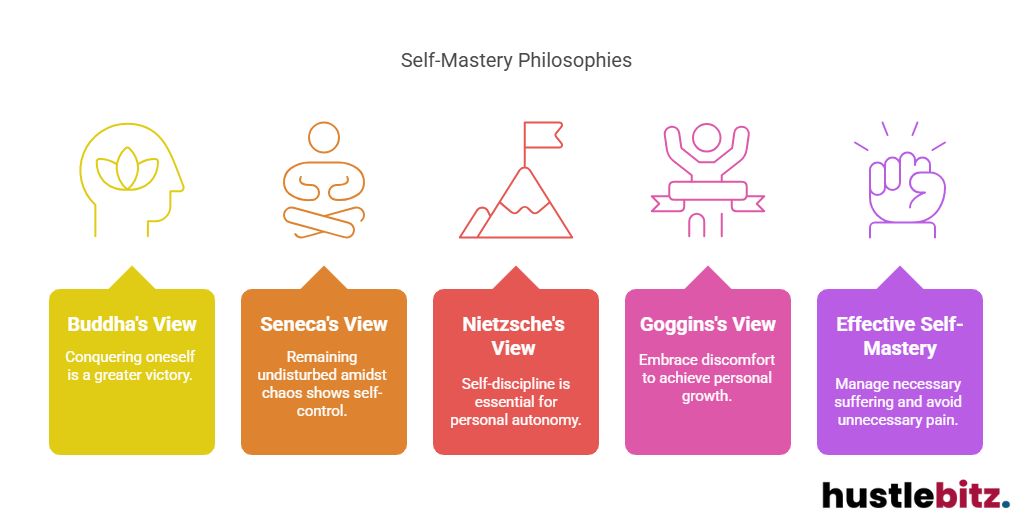Mastering self-control is vital for personal growth. As Buddha noted, the greatest victory is conquering oneself. Seneca emphasized the importance of remaining undisturbed amidst chaos, a testament to emotional regulation. Nietzsche highlighted self-discipline‘s role in achieving autonomy. David Goggins warned against the perils of a comfortable life, advocating for pushing beyond limits to uncover true potential. Emil Dorian championed the strength needed to endure only necessary pain. These perspectives underline the value of self-awareness, discipline, and resilience. Understanding how to harness these facets can lead to profound personal development. Learn how these insights can transform your journey.
Key Takeaways
- Buddha stresses that conquering oneself is a more significant victory than conquering others.
- Seneca highlights the importance of remaining undisturbed amidst chaos, reflecting true self-control.
- Nietzsche emphasizes self-discipline as essential for autonomy and personal freedom.
- Goggins advocates for embracing discomfort to push beyond perceived limits and achieve personal growth.
- Effective self-mastery involves managing necessary suffering while avoiding unnecessary pain for optimal resilience and empowerment.

“Though one may conquer a thousand times a thousand men in battle, yet he indeed is the noblest victor who conquers himself.” —The Buddha, Dhammapada

In the realm of personal development, few insights hold as much enduring wisdom as the words of the Buddha in the Dhammapada: “Though one may conquer a thousand times a thousand men in battle, yet he indeed is the noblest victor who conquers himself.” This profound statement underscores the paramount importance of self-control and inner mastery over external achievements.
Self-discipline strategies are essential in our personal growth journeys. They form the bedrock upon which we build habits that lead to long-term success. Techniques such as setting clear goals, maintaining a consistent routine, and practicing delayed gratification are instrumental in cultivating self-discipline. These strategies enable individuals to navigate life’s challenges with greater ease and purpose.
Inner strength cultivation involves nurturing a resilient mindset and fortifying one’s mental resolve. By engaging in activities that challenge and stretch our capabilities, such as physical exercise, learning new skills, and facing fears, we build a reservoir of inner strength. This inner fortitude is crucial for overcoming obstacles and achieving personal mastery.
Emotional resilience techniques further aid in this pursuit by helping individuals manage stress and recover from setbacks. Practices such as mindfulness meditation, cognitive restructuring, and emotional regulation exercises enhance our capacity to remain composed and focused amid adversity. These techniques are invaluable for sustaining emotional balance and fostering a positive outlook.
Incorporating mindfulness practices into daily life is another vital component. Mindfulness encourages present-moment awareness and reduces impulsive reactions, promoting thoughtful responses instead. This practice not only enhances self-awareness but also fosters a deeper connection with one’s inner self, facilitating a more profound journey towards self-mastery.
In essence, the journey of conquering oneself is a multifaceted endeavor that demands dedication to self-discipline, inner strength cultivation, emotional resilience, and mindfulness.
“There is no more reliable proof of greatness than to be in a state where nothing can happen to make you disturbed.” —Seneca, On Anger

Seneca’s wisdom on maintaining composure amidst chaos offers a profound insight into the essence of true greatness. This ancient Stoic philosopher emphasizes that the hallmark of true greatness lies in one’s ability to remain undisturbed, regardless of external circumstances.
In the realm of anger management, this ideal is particularly pertinent. Mastery over one’s emotions, especially anger, signifies a high level of personal discipline and self-awareness.
To achieve such emotional resilience, individuals must cultivate inner peace. This is not merely the absence of external turmoil but a deep-seated tranquility that allows one to navigate life’s vicissitudes without succumbing to disruptive emotional responses.
Inner peace acts as a buffer, shielding the individual from the impact of external chaos and ensuring that their composure remains intact.
Self-awareness is crucial in this endeavor. It involves a keen understanding of one’s emotional triggers and the ability to recognize the onset of emotional disturbances. By being self-aware, one can implement strategies to manage these emotions effectively before they escalate into anger.
This process of self-regulation is an ongoing practice that requires consistent effort and vigilance.
Moreover, personal discipline plays a pivotal role in maintaining this state of undisturbed tranquility. It demands the strength to adhere to one’s principles and values, even when faced with provocation or adversity.
This disciplined approach to life fosters a resilient mindset that is less susceptible to emotional upheaval.
“He who cannot obey himself will be commanded. That is the nature of living creatures.” —Friedrich Nietzsche, Thus Spoke Zarathustra
Friedrich Nietzsche’s assertion, “He who cannot obey himself will be commanded,” underscores a fundamental aspect of human nature and self-governance. This quote highlights the intrinsic necessity of self-discipline and personal accountability in achieving autonomy and freedom. When one fails to exercise self-control, external forces inevitably fill the void, dictating actions, behaviors, and ultimately, the course of one’s life.
Self Discipline Techniques are pivotal in this context. Establishing a routine, setting clear goals, and practicing delayed gratification can bolster one’s ability to obey oneself. Discipline is not the suppression of desires but the alignment of actions with long-term objectives. This alignment fosters Inner Strength Development, enabling individuals to remain steadfast in the face of challenges and temptations.
Emotional Regulation Strategies also play a crucial role in self-governance. Techniques such as cognitive reframing, deep-breathing exercises, and mindfulness practices help manage emotional responses, preventing impulsive actions that can lead to external control. Mindfulness Exercises, in particular, enhance self-awareness and presence, ensuring that actions are deliberate and aligned with personal values.
Personal Accountability Practices further reinforce self-discipline. By regularly assessing one’s actions and outcomes, individuals can identify areas for improvement and make necessary adjustments. Accountability partners or journaling can provide structured reflection and support in this process.
In essence, Nietzsche’s insight into the nature of living creatures serves as a powerful reminder: To achieve true autonomy and personal growth, one must cultivate the ability to govern oneself through disciplined practices, emotional regulation, and continuous self-reflection.
Only then can one truly command their own destiny.
“You are in danger of living a life so comfortable and soft, that you will die without ever realizing your true potential.” —David Goggins, Can’t Hurt Me
Many find themselves ensnared by the allure of comfort and ease, a trap that David Goggins warns against in his assertion, “You are in danger of living a life so comfortable and soft, that you will die without ever realizing your true potential.”
This cautionary statement sheds light on the peril of complacency and the critical need for continuous personal challenge and growth.
Comfort zones can be deceptively appealing, offering a false sense of security and satisfaction. However, it is essential to recognize that true potential often lies beyond these boundaries.
Personal growth emerges not from comfort but from embracing discomfort and pushing oneself beyond perceived limits. Self-awareness plays a crucial role in identifying when one has settled into complacency and requires a push towards greater challenges.
To break free from the confines of a comfortable existence and unlock your true potential, consider the following strategies:
- Set Ambitious Goals: Aim for objectives that stretch your abilities and force you to grow. Goals should be challenging enough to drive you out of your comfort zone.
- Seek Discomfort: Engage in activities that make you uncomfortable. Whether it’s public speaking, learning a new skill, or physical training, discomfort fosters resilience and personal growth.
- Reflect and Adapt: Regularly assess your progress and be honest with yourself about areas needing improvement. Adapt your strategies to ensure continuous development.
- Build a Support System: Surround yourself with individuals who challenge and inspire you. A supportive network can provide motivation and constructive feedback.
“Strong people alone know how to organize their suffering so as to bear only the most necessary pain.” —Emil Dorian, The Quality of Witness

Recognizing the peril of living within the confines of comfort and complacency, it becomes evident that self-mastery also involves the capacity to manage one’s suffering effectively. Emil Dorian’s assertion that “Strong people alone know how to organize their suffering so as to bear only the most necessary pain” underscores a crucial aspect of personal growth: the strategic approach to pain management.
In the realm of self-discipline strategies, emotional resilience plays a pivotal role. It is a well-acknowledged fact that life is replete with challenges and adversities. However, the ability to discern between necessary and unnecessary suffering distinguishes the strong from the weak.
Strong individuals possess an innate understanding of how to channel their energy towards overcoming essential difficulties while discarding superfluous distress. This selective endurance not only conserves mental and emotional resources but also fosters a more focused and purposeful approach to life’s trials.
Pain management, in this context, involves a mindful assessment of one’s personal suffering. By identifying the root causes of pain and addressing them directly, individuals can prevent the escalation of minor inconveniences into significant stressors. This process requires a high degree of self-awareness and the fortitude to confront uncomfortable truths about oneself.
Strength in adversity is not merely about enduring hardship but about optimizing one’s response to it. Through the deliberate organization of suffering, individuals can cultivate resilience and emerge stronger from their experiences.
The essence of Dorian’s quote lies in the wisdom to endure what is necessary for growth while relinquishing avoidable pain, thereby achieving a balanced and empowered life.
Final Thoughts
Mastering oneself through self-control, discipline, and resilience is a transformative journey. The wisdom shared by great thinkers like Buddha, Seneca, Nietzsche, and modern-day voices such as David Goggins and Emil Dorian reminds us of the importance of self-governance in personal growth. Whether it’s cultivating inner strength, regulating emotions, embracing discomfort, or managing suffering, these strategies offer essential insights for unlocking potential. By applying these teachings, we not only achieve autonomy but also create the foundation for sustained progress in life. Self-mastery isn’t about perfection, but about deliberate, consistent growth towards becoming the best version of yourself.




